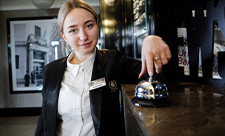By Artur Lupashko, the founder of the Ribas Hotels Group
In recent years, I have been active in creating new businesses. Every new project requires resourcing and, above all, finding a team, which turns out to be one of the key tasks. I'd like to share my rules for building a team that enable me to bring strong professionals together.
How to Quickly Evaluate the Specialist’s Hard Skills
When selecting applicants, I ask them to do a few things. First, to record a video business card (the applicant's task is to explain in the video why they see themselves in this job position); and second, to submit, along with a CV, any document that the applicant created on their own at previous jobs instead of a test assignment. This should be content that has been 100% by the applicant on their own: an article, report, sales plan and the like. I may well give consideration to personal travel plans or a weekly plan. This makes a difference because a document like that gives me a lot of insignt into the applicant. For example, the document can show whether the applicant is neat or messy, literate and skilled in handling documents.
How to Check the Specialist’s Soft Skills
After success in hard skills testing, we proceed to testing the applicant’s personality traits. There are several types of testing. They include one that is based on the fact that each of us has a predominant personality type in terms of work: integrator, entrepreneur, administrator, and producer. This is the baseline, which is important to understand: if you have a startup, you need an entrepreneur — flexible, adventurous, and steering clear of red tape. If you already have a running business, you’ll need a different type.
This is not the final choice, but only an auxiliary tool for gathering a team of people with similar personality traits, who will communicate with each other more easily, or teams of diverse people whose personalities are very different. For me, the key is Leonhard's accentuation test, a scientific method developed by Karl Leonhard. The test is online and takes no more than 15 minutes for the applicant. Then all work is done by a coach we engage. The coach conducts a 90-question test, which assesses skills according to 12 criteria and determines a person's personality traits and strengths. In the long run of working for a company, understanding the strengths will help to more consciously select an applicant for a job, adapt them to work with the manager, motivate, find common ground faster, delegate those tasks that a person is interested in.
Four Rules to Build a Team
Rule No. 1: Pay attention to people's soft skills. For me in particular, it is important that a person is full of energy. Being full of energy is the key skill, because it is the amount of energy that determines whether a person can be in sync with me. We are developing very quickly, we are extremely flexible, fast and active. So people who can't keep up with us don't work with us for long. For me, this is priority number one, to recruit energetic people into my team.
Rule No. 2: Have Any Successful Previous Experience. They say that everyone wants to hire people with experience. However, startups, for example, often hire people with little experience, because flexibility and creativity are essential here. What matters to me above all is how successful this experience is. I appreciate when a person has achieved results on their own, is able to explain the reasons for their success and prove that they deserve to be recognized. Even though it is a different industry or company, the applicant should be aware of cause and effect relationships and find ways to achieve results over and over again. For me, the very fact of achievement is an essential metric of an applicant's skills.
To read the rest, please visit LIGA.net.
Subscribe to our blog to not miss any of the expert content from our professionals!
















